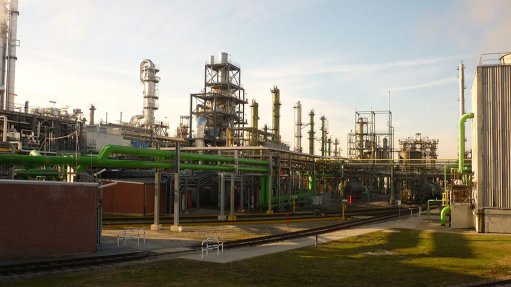
SASOL SOLVENTS GERMANY The 76% decrease in operating profit of Sasol’s solvents unit was as a result of the negative impact of the sale of its Solvents Germany operations
South African energy and chemicals group Sasol completed the disposal of its German and Iranian assets in the past year to “strategically reposition” its global operations.
Speaking at the company financial results announcement last month, in Rosebank, Johannesburg, Sasol president and CEO David Constable said the company had completed the sale of its German-based solvents business in May this year.
Sasol acting CFO Paul Victor added that the negative impact of the sale of Sasol’s Solvents Germany operations resulted in the group’s solvents unit’s 76% decrease in operating profit from R825-million to R200-million in the previous financial year.
“We disposed of our Solvents Germany assets, totalling R1.4-billion in impairment and disposal losses. Adjusting for the sale of assets, operating profit would have increased by 54%, boosted by overall production stability and a weaker rand, noted Victor.
Chemicals manufacturer Ineos Enterprises bought Sasol’s German-based European solvents business.
The acquisition comprised production facilities in Germany, based at Herne and Moers, which collectively employ about 520 people.
Ineos Enterprises states that the solvents business provides a complementary fit with the company’s “portfolio and expertise”, which has enabled Ineos Enterprises to integrate the business into its existing manufacturing sites in Germany.
The facility at Herne, in Germany’s industrial Ruhr district, manufactures ethanol and isopropyl alcohol, as well as catalysts for these products.
The Moers site, on the Lower Rhine, produces the oxygenated solvents, isopropyl alcohol, and secondary butyl alcohol, with the latter being upgraded on site to methyl ethyl ketone.
The plant also produces plasticisers, synthetic resins and fine chemicals, such as alkyl chlorides and aluminium organic compounds.
“The addition of this solvents business broadens Ineos Enterprises’ portfolio and presents new opportunities for integration into some of our existing upstream sites in Germany,” says Ineos Enterprises CEO Ashley Reed.
He highlights that the former Sasol operations are good-quality, well-placed assets, complemented by a very experienced operations team and high safety, health and environmental standards.
However, Reed notes that Ineos Enterprises continues to operate the maleic anhydride plant at the Moers site, as part of the ongoing joint venture (JV) between Sasol and chemicals manufacturer Huntsman Corporation.
He explains that maleic anhydride is the building block for unsaturated polyester resins, which are used mainly in fibreglass-reinforced resins for construction, automotive and marine products.
Meanwhile, Constable also pointed out that Sasol had sold its 50% share in Arya Sasol Polymer, a JV with Iranian State-owned petroleum and petrochemical products manufacturer Pars Petrochemical Company, to a South African subsidiary of an Iranian investor, Main Street 1095, for a purchase consideration of $365- million in August 2013.
A final loss of R198-million was recognised on the disposal of the investment and all outstanding amounts in respect of the purchase consideration have been received in full.
“Therefore, as a result, Sasol no longer has any active investments in Iran,” stated Constable.